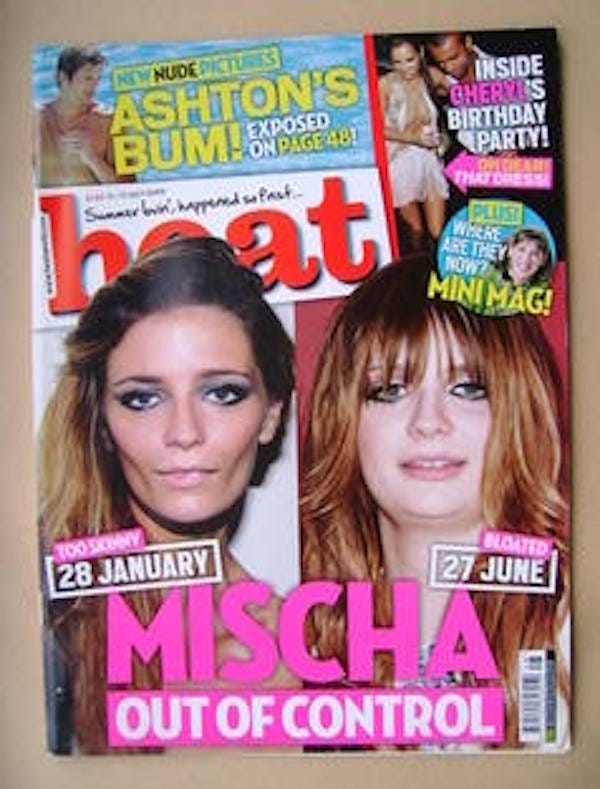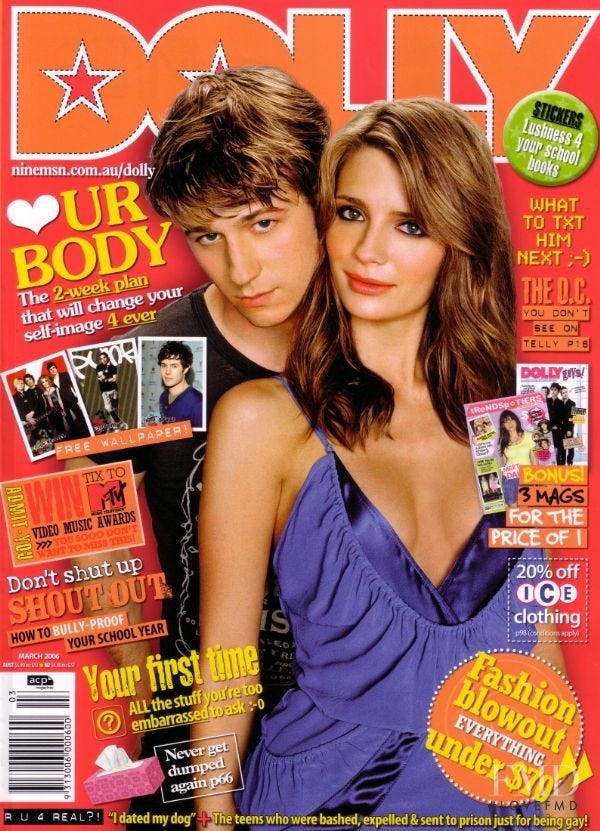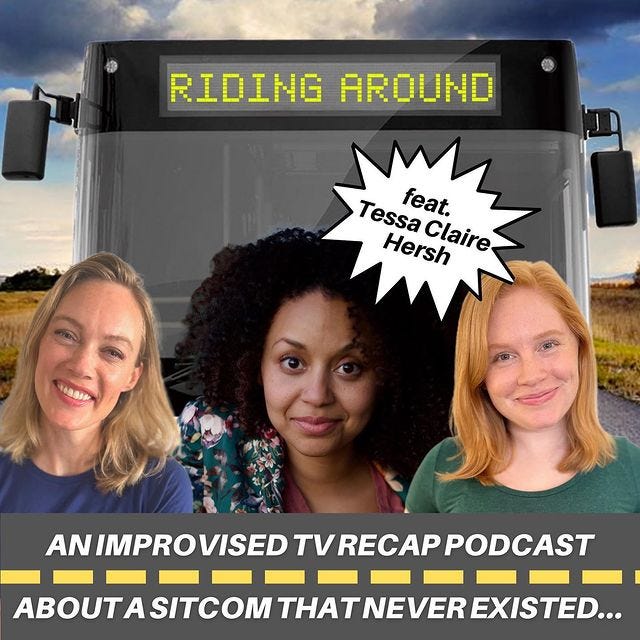6. Newport Beach
California, here we come.
Small age gaps of a few years don’t mean much in your thirties, but if you talk to friends who are 33 when you are 39, for example, about what you all watched on TV as kids, preteens, and teenagers, the answers will be wildly different. What was babyish for me was formative for them, what was key to my mental development was something they think of as “that old show.”
When The O.C. premiered, I was 19 and having sex for the first time and going to a really demanding college that involved a lot of hours in a wood shop. I can’t say now that I was doing anything more important than catching this show as it aired and I was certainly not above watching it, but I was definitely busy and did not have a TV. I was also turned off by how quickly Mischa Barton suddenly skyrocketed to fame as the lithe and lovely Marissa Cooper. She was on the cover of every tabloid, posted about in every blog (blogs have been key to my daily life since about 2002, sadly), and on every red carpet. It was impossible not to absorb information about her, particularly this slavering obsession with her thinness and then the cruel monitoring of her body once she left the show, as though the visible signs of ageing signified she never should have given up her contract.
I didn’t realise then how young she was, around 16 when the show began. Her co-star and love interest Ben McKenzie was around 24. As a 16-year-old I would probably still have wanted to make out with Ben McKenzie. I certainly would not have had the poise and grace to do so on camera.
Anyway, in August, I came down with a cold. Summer colds are very demoralising, because you don’t want to drink hot soup or get cozy under the blankets. You want to go to the beach and drink half frozen alcohol. There was still the mental blanket of TV, and this year happened to be the twentieth anniversary of The O.C., so I was seeing references to it everywhere. It premiered in August of 2003. Twenty years later, I watched it for the first time. Feverish, coughing, feeling sorry for myself, I watched a show I basically knew nothing about, except that the idea of Mischa Barton used to annoy me.
Once I was recovered, every time I told one of my younger than 39-year-old friends that I was watching it or had just watched it, their voices would gets high-pitched and loving, eyes starry, looking back to a time when they were just starting high school and dreaming of complicated romance. Everyone was in love with someone on that show, particularly Adam Brody as Seth Cohen. Lots of think pieces about how Seth Cohen actually sucks were circulating that month, as editors paired freelancers with timely personal essay topics. I’m very grateful to genuinely say I never thought he didn’t suck, though Adam Brody is charming enough to make any obsessive loser compelling. Rachel Bilson? I had no idea she was on the show. Ben? I didn’t even know he existed, but I will now probably think about him semi-regularly until the day I die.
A lot of people crap on Mischa Barton’s acting, too, as though she wasn’t just a kid who happened to be taller than most adult woman. She’s not good, at first, but she eventually becomes Marissa Cooper. A young girl who grows up in bizarre circumstances that force her into an early adulthood, before burning out in a terrifying way. Marissa, however, died and Mischa Barton is very much alive. In recent interviews, she’s insinuated she was hyper-sexualised and even bullied on set and that pretending to be having sex on the show bled into her real life in ways that she doesn’t love.
I only know all of this because when I was sick and totally entranced by The O.C., I was trying to piece together every bit of behind-the-scenes drama I could via my phone while also texting anyone who didn’t block me all about it. At one point, I asked two friends if we could drive to Newport Beach to have a The O.C. Day and they agreed. By the time I felt well again, the spell had broken. I was glad that I had watched it. The need to actually stroll the boardwalk at Newport and search for fictional characters who ceased to be two decades ago had faded. I never even finished the final season. Marissa was dead. Who cares?
But the plans were already in place and ultimately I followed through because why not. I had never been there. And we must do things to fill the time or it passes both too quickly and too slowly to enjoy. It was a long drive, done entirely by my friend Shirin who would hate to have anyone else at the wheel. Ariel sat in the back, and I zoned out in the passenger seat up front. As is expected in Southern California, the day was sunny, warm, and gorgeous. We laughed quite a lot on the way there and happily they are two people who love TV. They have even managed to have jobs in the industry while I flail in bed and watch what they make. First, we got into the fine gossip details, favorite characters and moments from the show, comparing our own experiences of being unfashionable teenagers. I don’t like to get all high and mighty about storytelling — what am I, a Game of Thrones producer? — but the best thing about TV, movies, and books for me is discussing them with other people. You can learn so much about how they see the world and why, and reconsider your own perspective. I often read media criticism without watching the media, just to see how someone else absorbed a story and what it brought out of them. Sort of like a mushroom rising from the ground after a rainy day. Maybe I’ll go back and watch it, maybe I’ll wait 20 years. In the meantime, I think about it.
Newport Beach is similar to a lot of beach towns; it appears as though primarily rich people live there and everyone else is tasked with the labor of maintaining their pristine experience. The souvenir shops seem to all be owned by one family, even though each of them promises better deals than the last. There is a lot of soft serve ice cream, thank god. And you can get a mid fish sandwich for around 17 dollars. Our waitress looked like she was a college freshman and we whispered to each other that she reminded us of Marissa. Lightly freckled by the sun, out-of-date smudged eyeliner, highlighted hair pulled back in a low ponytail. She did make the story more real in a way. Even though it was a soap opera, The O.C. captured something true about what the place feels like and the people populating it, at least the ones who work front-of-house at boardwalk restaurants.
We wandered to the beach. The waves were enormous, creating a huge ditch-like drop off where they broke so that when the water rose it became almost a glass wall suspending the delicate legs of the few swimmers daring enough to climb it. I kept expecting to see a shark caught like canned fruit in green gelatin heading towards their kicking feet.
On our way home, we did one last turn down the peninsula looking for I don’t know what. I wanted to see more, ferry somewhere or hop in a kayak. Perhaps if we went a little bit farther, turned one more corner, we’d fall into an alternate reality where the cast existed, living lives that were objectively horrible yet intensely meaningful. One thing I said very seriously on the car ride and which I still think is true, is that The O.C. is really about rage. It was expressed differently by different characters—through drinking, otter activism, indie rock, cheating, and the always-in-style sucker punch. Some of that rage was deserved, some of it was ridiculous, all of it had to be dealt with and transmuted into something else before it destroyed lives. But as soon as they stop being angry, they got really boring.
We finally sped out of town, playing Phantom Planet’s “California,” which is almost too corny to admit, but whatever. It was fun.
Then we listened to the very popular podcast hosted by former cast members Rachel Bilson and Melinda Clarke, “Welcome to the OC, Bitches!” where they recap the show and invite on people who worked on it both behind-the-scenes and in front of the camera. On this episode, Mischa Barton finally dropped by, shortly after her interview insinuating her time on set had been much more fraught than people knew. You can hear Clarke and Bilson dance around the topic, wanting to get into some of what Mischa has said about her experience and they keep getting deflected before nervously giving up.
But the most shocking part is when they discuss the scene where Marissa iconically shoots Ryan’s brother in the back, and Mischa cannot remember why Marissa did it. It’s like she’s blacked out her time there, forgotten the character who has since defined her career and how everything she does is received. It’s a pivotal moment in the show’s mythos, and yet, she has no idea why it happened. Something that matters so much to so many fans really doesn’t register with her and I find that incredible. Beautiful, even. The ghost of Marissa will never possess her again. She is free!
After I got home, I tried to recapture the magic of watching early aughts TV shows I never did the first time because I was too busy being cool. But nothing measures up. Gossip Girl, One Tree Hill. They just don’t have that certain something. I turned them off long before the final season.
I must recommend Riding Around, a satirical send up of podcasts made by actors hanging onto their glory days through recaps and interviews. Hilarious improv with wonderful guests and elaborate world building.
Here’s the aggressively non-revelatory podcast episode with Mischa Barton.
She still looks fine as hell, I don’t care.
That’s all, readers, though I would love to know literally ALL thoughts on this show still, I can’t talk about it enough, help!






